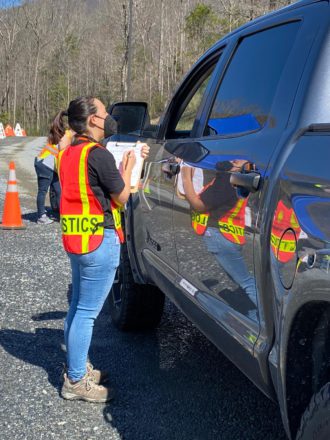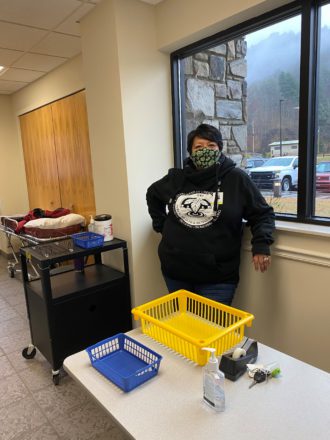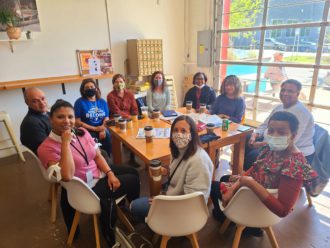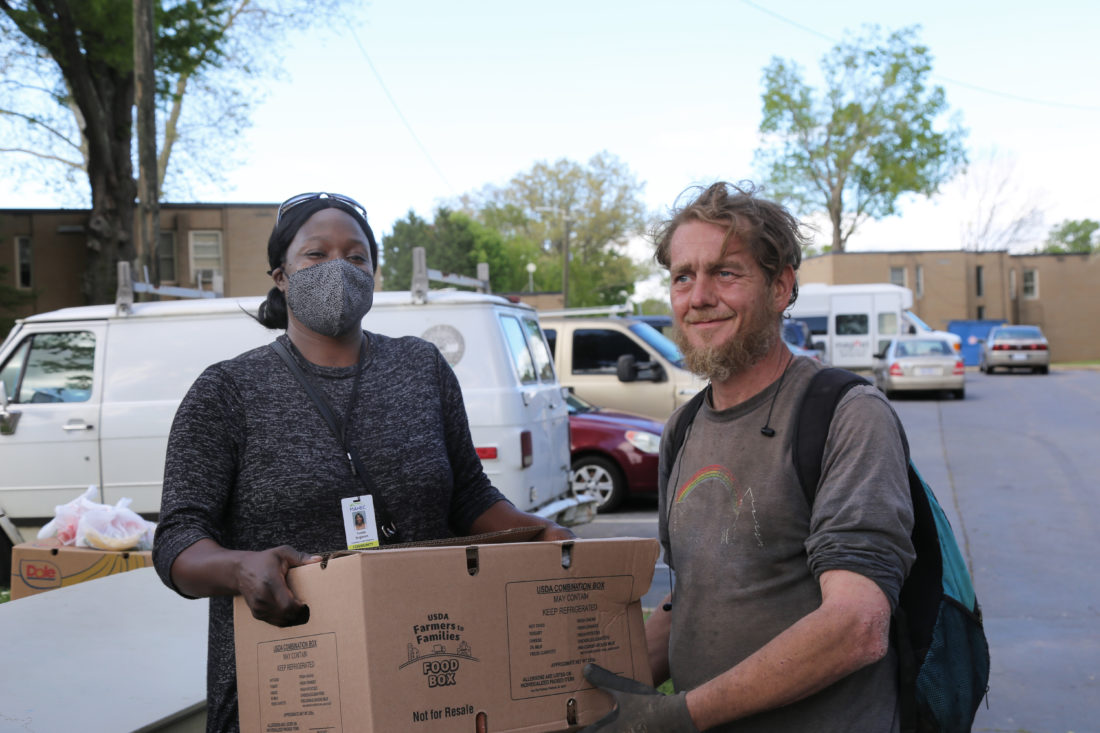In fall 2019, the nonprofit Mountain Area Health Education Center and regional community organizations began considering one key question: What would it look like if, by 2025, every Western North Carolina resident experiencing the impacts of structural racism and systemic poverty had access to community health care services?
MAHEC formally launched the WNC Community Health Worker Initiative soon after, bringing together a coalition of 24 organizations to advance the community health worker model locally. Workers, many hailing from the neighborhoods they served, fanned out across the region, embedding themselves as community fixtures to offer support and resources for people in need.

And when the COVID-19 pandemic hit, that support was at the ready. For Laura Zapater Urrea, a MAHEC-supported community health worker recently hired to work with McDowell County’s Centro Unido Latino-Americano, no two days are the same. She and her team do whatever’s needed to help people stay healthy, whether that’s sharing COVID-19 resource materials with local Latino-run restaurants or helping unemployed workers find money to cover late rent payments.
“That’s all part of what we as community health workers do,” she says. “When someone calls and needs help, we help them find resources and we keep checking in to make sure they’re doing all right.”
Pandemic pivots
The American Public Health Association defines a community health worker like Zapater Urrea as a “front-line public health worker who is a trusted member and has an unusually close understanding of the community served.” Many don’t have traditional medical backgrounds, instead serving as boots-on-the-ground links between existing health systems and underserved groups. All actively work to build trust and improve health outcomes through repeated interactions.
Inspired by their early success, MAHEC and its partners decided to grow the community health worker network again in 2020, this time with an emphasis on COVID-19 outreach, explains Evan Richardson, MAHEC’s director of community health integration. With roughly $900,000 in support from the Dogwood Health Trust, hospital legacy foundations and state funds, Richardson and her team launched the WNC COVID Community Health Worker Initiative to hire additional personnel to fight the pandemic in underserved communities.
“Community health workers are critically important to successful public health outreach efforts,” says Dr. Susan Mims, DHT’s interim CEO and former chair of MAHEC’s community and public health department. “We are proud to support the Community Health Worker Initiative with MAHEC and the legacy foundations. We are seeing how this important role is helping people get COVID-19-related care and stay connected to other needed health services, including preventive and chronic disease care.”
Thus far, the partnership has hired nine community health workers to work in 17 of the 18 westernmost counties in North Carolina, Richardson says. MAHEC is actively working to identify sustainable long-term funding options; additional funding opportunities may arise after North Carolina transitions to a Medicaid managed care system beginning on Thursday, July 1.
“Part of the long-term impact of COVID is about all of the underlying conditions that have contributed to the virus’s disproportionate impact,” Richardson says. “This is a workforce who has that trust, connection and inherent knowledge of what people are experiencing and are trained and equipped to address individual and community health. This is a workforce that can really make an impact.”
A personal connection

Candy Crowe grew up in Snowbird, a community in rural Graham County. A member of the Eastern Band of Cherokee Indians, she moved to Cherokee 35 years ago. Several children and grandchildren later, she remains an active member of the community.
Crowe has worked as a certified nurse’s aide, a drug elimination coordinator for Qualla Housing and in various roles for more than a decade at the Boys and Girls Clubs of America. She knew she wanted her next job to involve working with the tribe, but the pandemic struck just as she was preparing to go back on the job market.
So she waited. In October, she saw a job posting for a community health worker through MAHEC on Facebook and instantly knew it was a perfect fit. “I read the job description and kept thinking, ‘That’s me,’” Crowe recalls.
After being hired in November, Crowe was stationed with Tsalagi Public Health and the Public Health and Human Services Department for the EBCI. Early on, her days were filled with phone calls to COVID-19 patients in Jackson and Swain counties, making sure they had enough food at home to last the duration of a two-week quarantine and matching them with public health resources to help stop community transmission.
Now, her focus has shifted to the coronavirus vaccine rollout. She shares information about the shot and answers questions from tribal members who are hesitant to roll up their sleeves — a mentality she fully understands.
“I was very hesitant at first when I had [the vaccine] offered to me and I wanted to know more,” Crowe says. “So I understand the uncertainty and see how important trust is. People have to trust you, and that’s where we can play a part.”
Zapater Urrea of McDowell County is also a regular face at the vaccine clinics held every Friday in Marion. The language barrier can be a major challenge for distributing vaccines to Spanish speakers, she says, and her presence can help overcome some linguistic and cultural obstacles.
“When [Spanish speakers] see that there’s someone there who can understand them, they feel more relaxed, like someone will be able to help them,” she says.
Future of health
The community health worker model has been around for decades, Richardson says, and is likely to last long after the current pandemic ends. From encouraging people to seek out preventive health care to providing resources for chronic conditions like diabetes, community health work is uniquely positioned to address the systemic health disparities that caused the pandemic’s disproportionate impact on communities of color.

Workers are trained to focus on the full range of social determinants of health, placing equal emphasis on economic stability, access to education, a safe neighborhood and built environment, social support and quality health care.
That comprehensive look at differing needs could have big implications for the region, says local entrepreneur J Hackett. The co-owner of the GRIND AVL coffee shop and former executive director of the nonprofit Green Opportunities became involved with community health work in 2019 and now serves as a mentor for MAHEC’s WNC Community Health Worker Initiative.
“The pandemic, as with most crises, exposed the weaknesses in our society and the disparities among certain groups and neighborhoods and demographics,” says Hackett. “It forced many people to pay attention to what’s going on. There was an effort to do something innovative, but you can’t do that without the people who are directly impacted.”
Last year, Hackett launched the first community health worker apprenticeship to be approved by the Apprenticeship NC program, managed by the state’s community college system. Participants work for Jordan Peer Recovery, a organization led by Hackett that trains peer specialists to assist individuals who use substances with reentry and recovery, and take courses from Catawba Valley Community College. MAHEC serves as the employment partner, Hackett says, and three apprentices are currently enrolled in the program.
The model is easy for other organizations to replicate, he says, and provides yet another outlet for residents to transition into community health work. Paired with MAHEC’s monthly community health worker mentorship meetings, members working across the community health spectrum are developing best practices and working through challenges.
“At its core, community health work focuses on health and education, but that transcends into pretty much any topic — COVID, diabetes, hypertension, tobacco use, you name it,” Richardson says. “By going into communities, we’re able to come together and create lasting solutions that will hopefully overcome significant inequities.”
Editor’s note: This story was updated at 4:08 p.m. on May 27 to clarify MAHEC’s role in the community health worker program and to adjust language used to describe those who use substances.




They’re the ones who need big donations…not junk food distributors.